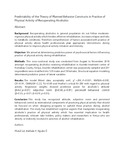Please use this identifier to cite or link to this item:
http://ir-library.mmust.ac.ke:8080/xmlui/handle/123456789/2011| Title: | Predictability of the Theory of Planned Behavior Constructs in Practice of Physical Activity of Recuperating Alcoholics |
| Authors: | Mutuli, L.A Bukhala, P Nguka, G |
| Keywords: | Predictability ,Theory ,Planned, Behavior, Constructs, Practice, Physical, Activity, Recuperating, Alcoholics |
| Issue Date: | 17-Feb-2020 |
| Publisher: | Journal of Alcoholism Drug Abuse & Substance Dependence |
| Abstract: | Background: Recuperating alcoholics in general population do not follow moderate-vigorous physical activity which hinders effective rehabilitation, increases relapse and risks to metabolic conditions. Therefore comprehension of factors associated with practice of physical activity allows health professionals plan appropriate interventions during rehabilitation to improve physical activity initiation and intensity. Objective: We aimed at determining predictive power of psychosocial factors influencing practice of physical activity during rehabilitation. Methods: This cross-sectional study was conducted from August to November 2018 amongst recuperating alcoholics receiving rehabilitation in Asumbi treatment center of Homabay County, Kenya. Asumbi rehabilitation center was purposively sampled and 207 respondents were stratified into 129 males and 78 females. Structural equation modeling determined predictive power of latent variables. Results: The model fitted data acceptably well, χ2 =200, P<0.001, RMSEA=0.087, CFI=0.91, CMIN/DF=2.22, TLI=0.89 and Hoelter’s critical N=200 with regard to physical activity. Regression weights showed predictive power for alcoholic’s attitude (β=62, p<0.01) subjective norm (β=0.60, p<0.01) perceived behavioral control (β=0.55, p<0.01; β=0.09, p>0.05). Conclusion: This study has recognized attitude, subjective norm and perceived behavioral control as motivational components of practicing physical activity that should be focused on when designing programs to uphold these practice during alcohol rehabilitation. The study has established cognitive aspects that manipulate recuperating alcoholic’s practice of physical activity which has essential implication to health professionals, relevant take holders, policy makers and researchers in Kenya who are directly or indirectly involved in activities of alcohol rehabilitation. |
| URI: | https://doi.org/10.24966/ADSD-9594/100016 https://www.heraldopenaccess.us/openaccess/predictability-of-the-theory-of-planned-behavior-constructs-in-practice-of-physical-activity-of-recuperating-alcoholics http://ir-library.mmust.ac.ke:8080/xmlui/handle/123456789/2011 |
| Appears in Collections: | Journal Articles |
Files in This Item:
| File | Description | Size | Format | |
|---|---|---|---|---|
| Predictability of the Theory of Planned Behavior Constructs in Practice of Physical Activity of Recuperating Alcoholics.pdf | 228.46 kB | Adobe PDF |  View/Open |
Items in DSpace are protected by copyright, with all rights reserved, unless otherwise indicated.
